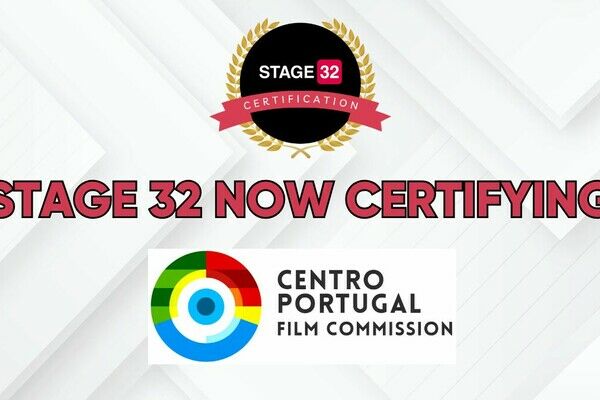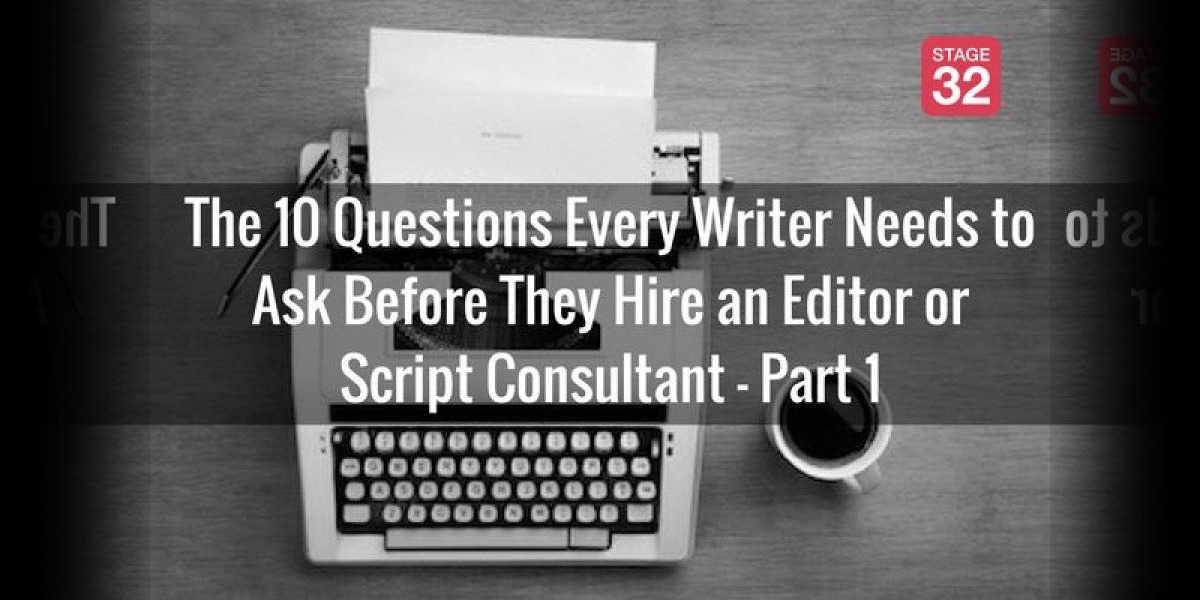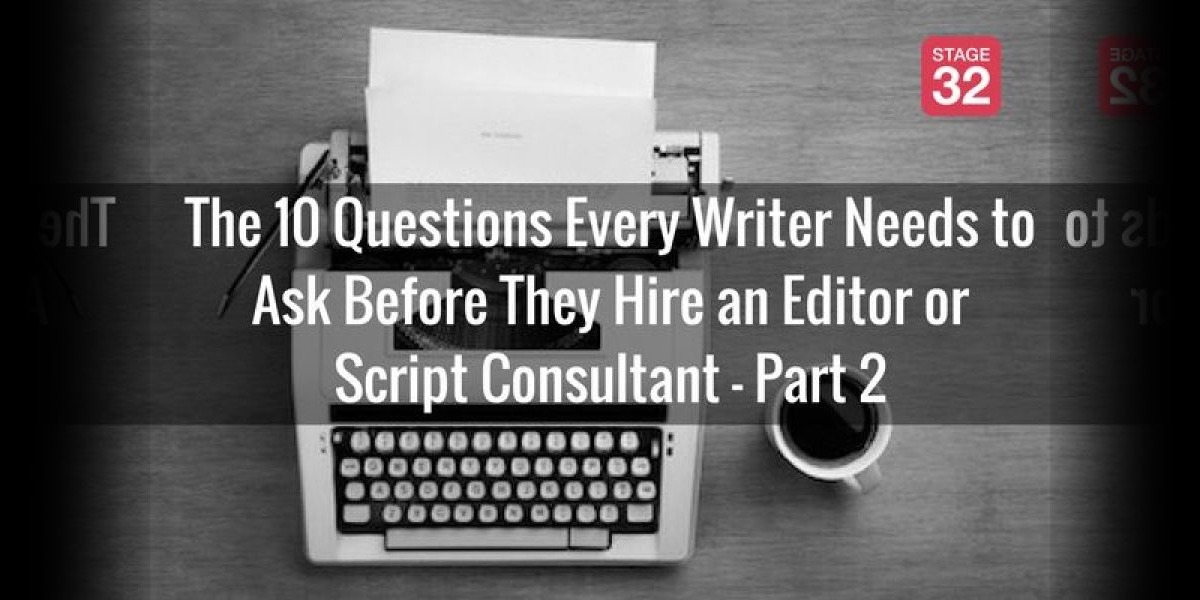The 10 Questions Every Writer Needs to Ask Before They Hire an Editor or Script Consultant - Part 2
In Part 1, I examined the five essential questions every writer must ask any third-party consultant BEFORE they hire him/her for a freelance position, be that book line editing, developmental editing, story structure help, screenplay writing help, or any generic service related to publishing or the entertainment business. But, as I said in Part 1, those five questions are just one side of the equation of freelance hiring.
The following five questions are designed to balance the equation, and set you on a solid path for building professional and productive consulting relationships. These five questions are fairly intuitive and obvious in some ways, but they also represent issues that many writers tend to avoid, because they are outside their comfort zones. Most of us are not used to engaging professional services as writers, and the consulting and editorial zoo out there is fraught with snake oil and hucksterism. All the more reason to master the first five questions from Part 1, and the questions below.

FIVE QUESTIONS TO ASK YOURSELF
- Can you afford them?
Pricing is always a difficult topic when hiring a third-party. Usually consultants will have their fee schedules posted on their websites, so you know going in what to expect. With Script consultants there are no best practices for charging fees; it's pretty much 'make it up as you go along'. Things that can affect pricing might be their years in the business, big client lists, professional credits, etc. The bottom line here is you will have to gauge for yourself if you think their fees are agreeable or not. But, how can you know? Are there any standards you can use to compare and contrast? Or are you just stuck going with their first quote and ending up with 'you get what you pay for'. The smartest approach is to do your research; check out as many other consultants as you can and compare pricing and services. You will quickly get a feel for the market and then you can determine if that outrageous fee they're asking for is value-added and justified or not. Script consulting pricing is the wild west and there's not much you can do about it, so do your homework and then draw your own lines in the sand based on your budget and your research.
Everything I just said about script consultants also applies to book editors, except that there are some best practices in place for freelance book editor's fees. As mentioned earlier, the Editorial Freelancers Association (EFA) has posted standard rates for all categories of editorial work. These are just starting points for negotiating a deal, but at least you can know what is considered fair and right within the profession. So, buyer beware, do your homework.
- Are you comfortable with the consultant's clients' publishing/producing records?
When you hire an editor or script consultant you are hiring an editor first, and a writer second. I say this because people incorrectly ascribe competence as an editor or story consultant based on how many books they've written or screenplays they've sold. This is irrelevant. Editorial talent is different than writing talent. The greatest editor in the history of publishing, Maxwell Perkins, never so much as published a recipe in his fifty-plus years with Charles Scribner's & Sons, and yet he was singlehandedly responsible for helping two of his clients win Nobel Prizes in literature (Hemmingway and Fitzgerald). So, the measure of a consultant's value should not be based on their personal publishing or sales record. It should, however, be based on the publishing or sales records of their client's books and screenplays. So, ask book editors what publishing successes their clients have had; ask script consultant how many of their clients got script sales, awards, or producing deals. You will have to weigh how comfortable you are hiring an 'expert' with a client list filled with low-sale, self-published books with terrible Amazon category rankings; or a script consultant with few or no clients with produced IMDB (Internet Movie Database) credits or festival awards. Again, having a weak client list doesn't mean they can't do the job, but know going in so you can be fully informed in your decision-making process.
- Are you willing to fire the consultant if you are dissatisfied?
Are you comfortable managing them, and not being managed by them? Because if you don't take control of the relationship, the consultant will, by necessity. The consulting relationship will go off the rails unless someone is managing the process. That 'someone' should be the client, not the consultant. Part of that process involves hiring, but also firing. Can you do that? It's easier said than done for a lot of people. Most people want to avoid conflict and will just ride out the experience and move on, losing money, time, and their sanity. But it doesn't have to be that way. Build checkpoints into the relationship so that you can measure progress and discuss problems, delays, or failure sooner than later. In short, for one-off projects this is less of an issue, but you still have to be willing to step up and fire the consultant if things are going south and you are not happy. This is where contracts are important. Termination clauses need to be written so that you can fire someone cleanly and with as little exposure as possible on your end. If you don't get a contract, at least get written agreement in an email explaining your criteria for releasing the consultant if you are unhappy. The bottom line here is: are you willing to be a boss and not a passive player in some consultant's agenda?
- What kind of consultant do you really need?
All consultants and editors are not created equal. Many consultants will tell you they do it all, don't believe them. It's best to work with professionals who specialize in one type of editing, not doubling or tripling up on skill sets. Here are the basic types of editors and consultants you will need:
Types of Book Consultants:
Line Editors: these are the 'small picture' editors focusing on grammar, punctuation, sentence structure, consistency of word usage, spelling, and some rewriting, but at a very light level. They should have a solid understanding and knowledge of the Chicago Manual of Style, this is the main style guide used in the book business. Their job is one of crossing t's and dotting i's (novels, nonfiction, newspaper/magazine copy, online content). Copy-editing is essentially the same thing as line editing.
Proof Readers: proof readers are the last person to get their eyes on the manuscript. They essentially 'proof' the final typeset text for its final approval before it goes to actual press. Outside the special world of the publishing company, proofers are often just seen as another kind of line editor, but they are really more than that. Even after line editing, you may want to hire a proof reader to do the final-final on your manuscript, but that all depends on the competency level of your line editor.
Developmental Editors: these are the 'big picture' editors. They focus on storytelling, author voice, narrative design, research, book formatting and organization, make suggestions on story or content revisions, and generally assure the manuscript is well-organized, consistent in style and tone, and clearly articulated as a piece of fiction or nonfiction. Sometimes they'll fact check, but this is usually a separate person.
Types of Screenwriting Consultants:
Story/Development Consultant: These consultants are essentially developmental editors, but specialize in the film/TV format. Story consultants focus on the big picture, just as book editors do, and concern themselves with the large story structure, pacing, formatting, and narrative flow issues any developmental editor would be concerned with in a fiction or nonfiction narrative. The key difference between them and book developmental editors is that they have expertise in feature film, television, and new media storytelling vs. long-form prose fiction/nonfiction.
Pitching Consultant: Pitching consultants specialize in preparing you to pitch your film or television projects to contests, pitch fests, or to production companies. They help you come up with a great log line, develop a 'pitch package', identify market opportunities, write a good synopsis, and possibly have some other value-added services to set themselves apart in the marketplace.
Story Analyst: These consultants are the workhorses of the script evaluation business. Commonly known as 'readers', story analysts provide industry standard coverage, which is a standard deliverable common to creative agencies, production companies, studios, and indie producers. Readers are usually not something indie writers would have to worry about unless their script got picked up by an interested agency or producer, but many script evaluation services exist now giving this service.
Adaptation Consultant: These consultants help you adapt your screenplay to the novel format, or the other way around. They will help you rewrite your book or screenplay, depending on which service you seek, and guide the process so the final deliverable will be a marketable book or screenplay. This requires specialized understanding of either the publishing and prose worlds, or the film/TV worlds, so it is important to make sure the consultant has experience in their given area.
The more you are exposed to professionals, the smarter you will become recognizing those who are truly talented and productive. You will have to kill a lot of frogs, however, before you find your prince.
- Can they do an interview and walk and chew gum at the same time?
It should be obvious that asking the first five questions will require actually talking to the editor or consultant. If at all possible, talk to them over the phone or video chat. Don't settle for texting or email. How they present in person can tell you a lot about how comfortable they are with you and vice versa. Can then talk clearly, do they make sense, are they confident, do they ask you questions and not just passive wait for you to ask them, do they leave you feeling they can do the job and that they actually like what they're doing. That's more of a issue than you might imagine.
Conclusion
Asking these ten questions (read Part 1 and Part 2) will help you not only find the right editor or script consultant, but will make you the kind of client consultants will enjoy working with. The snake-oil-salesmen hucksters will quickly expose themselves, and the gems in the rough will always shine through. Writing is a lonely game, you don't have to do all of it alone. In fact you can't, if you expect a real career. Learn the skills for hiring third parties and empower yourself with the confidence and composure that comes from knowing what you want, without giving your power away to any expert or consultant. Remember: Listen to everyone, try everything, follow no one. You are your own guru.

About Jeff Lyons
Jeff Lyons is a published author, screenwriter, editor, and story development consultant with more than 25 years' experience in the film, television, and publishing industries. He has worked with literally thousands of novelists, nonfiction authors, and screenwriters helping them build and tell better stories.
Jeff is an instructor through Stanford University's Online Writer's Studio, University of California at Riverside's Extension Program, and is a regular guest lecturer through the UCLA Extension Writers Program. He is a regular presenter at leading writing and entertainment industry trade conferences, as well as a contributor and advisor to leading entertainment industry screenwriting and producing fellowship programs, such as the Producers Guild of American's "Power of Diversity Producing Workshop," and the Film Independent Screenwriting Lab. Jeff is also a regular guest blogger on major writing industry blog sites like Script Magazine and Stage32.com. Over the years, he has been a trusted story development consultant to many indie producers, produced screenwriters, production companies, and VR and new media content developers.
Jeff has written on the craft of storytelling for Writer's Digest Magazine, Script Magazine, The Writer Magazine, and Writing Magazine (UK). His book, Anatomy of a Premise Line: How to Master Premise and Story Development for Writing Success, is the only book available devoted solely to the topic of story and premise development for novelists, screenwriters, and creative nonfiction authors. His other book, Rapid Story Development: How to Use the Enneagram-Story Connection to Become a Master Storyteller, will be published by Focal Press in late 2017.
In addition to his nonfiction work, Jeff is co-authoring (with Stephen David Brooks) the Jack Be Dead Series, the first volume of which was published on Amazon in March 2016, Jack Be Dead: Revelation. This, and his other genre fiction work, is published through Storygeeks Press. Jeff's author site can be found at: www.jefflyonsbooks.com Jack Be Dead can be found at: www.jackbedead.com. Author: Anatomy of a Premise Line (Available Now)
Like this blog post? Please share it on social media (Facebook, Twitter, LinkedIn, email etc) by using social media buttons at the top of the blog. Or post to your personal blog and anywhere else you feel appropriate. Thank you.
As always, we welcome thoughts and remarks on ANY of the content above in the Comments section below...
| Happy New Year! What Are Your Goals? |
| The 10 Questions Every Writer Needs to Ask Before They Hire an Editor or Script Consultant - Part 1 |
Search Stage 32 Blog
There are now 4034 blog posts for you to enjoy. Search them all by tags below.
Acting, Advice, Cinematography, Coffee & Content, Composing, Contests, Distribution, Featured, Filmmaking, Financing, Inspirational, Networking, Producing, Screenwriting, Success Stories, Tips, Trending,Relevant Tags
Recommended Articles
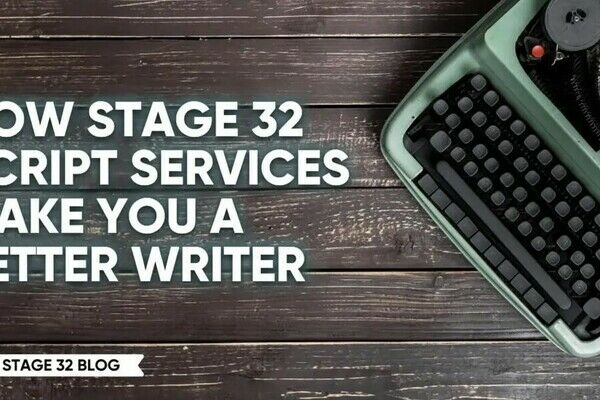
How Stage 32 Script Services Make You A Better Writer

7 Life Hacks For Creatives
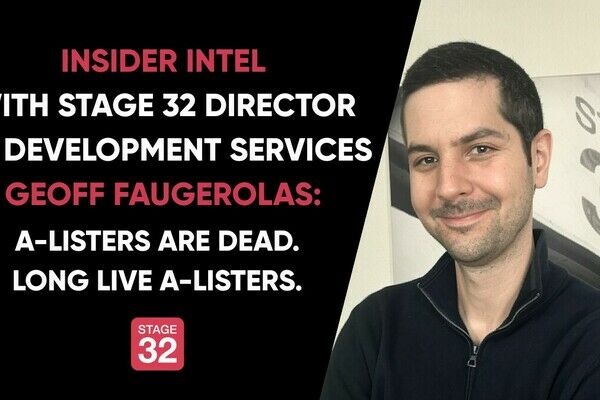
Insider Intel: A-listers Are Dead. Long Live A-listers.

Happy Thanksgiving From Stage 32: We Are Thankful For YOU
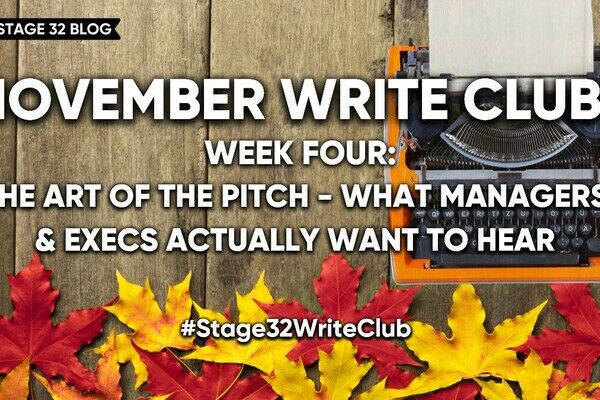
November Write Club Week 4: The Art of the Pitch- What Managers & Execs Actually Want to Hear

Want Success in the Entertainment Industry? Start Writing Your Own Narrative
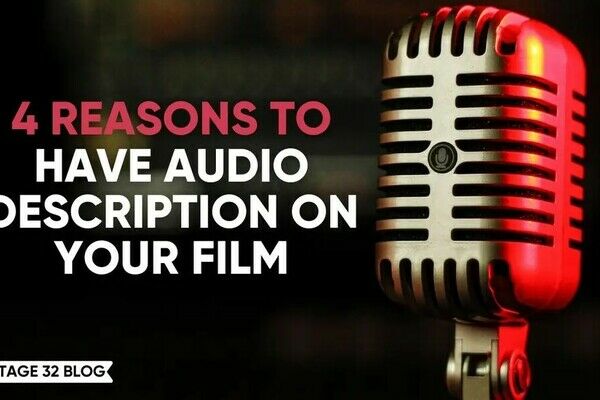
4 Reasons To Have Audio Description On Your Film

A Practical Guide for Actors: Tips & Advice Every Performer Should Know

Green Lights and Grey Areas: Expanding Creative Collaboration in Publishing
